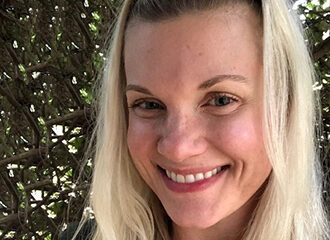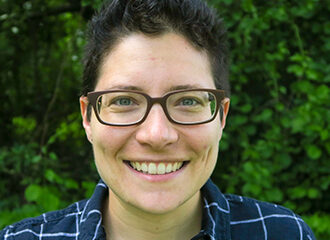By: Erin Birely, LCPC, The Renfrew Center’s Alumni Services Coordinator
As August comes to an end, many college students are already back on campus and adjusting to the change in schedule and environment. Whether it’s your first or final term, each year of college brings fresh changes as expectations change, as well as our living situation. We’re possibly moving in with new roommates, possibly friends, or just switching our bedrooms for dorm rooms and home cooking for a dining hall. For those with a history of eating disorders or who are just struggling with the adjustment, the dining hall and expectations around managing our own nutrition can be a difficult stressor.
According to National Eating Disorder Coalition, “While eating disorders can affect anyone at any age, they remain more prevalent among adolescents and young people, with the average onset for eating disorders between the ages of 12 and 25 years.” This makes college aged individuals, usually 17 to 23 years old, at a higher risk for the development of an eating disorder. Anyone who has lived through college knows this time in life bring with it many social, emotional, and physical changes. All of these changes can leave us feeling out of control or unsure of ourselves and searching for a way to control and feel safe and secure in our bodies.
For those athletes returning to college, body image and nutrition can take on another role as their identity as an athlete may be coming to an end, or their need to perform is intensified for the team or perhaps an athletic scholarship. According to one study, “35% of female and 10% of male college athletes were at risk for anorexia nervosa and 58% of female and 38% of male college athletes were at risk for bulimia nervosa” (The National Center on Addiction and Substance Abuse (CASA) at Columbia University Food for Thought: Substance Abuse and Eating Disorders. The National Center on Addiction and Substance Abuse (CASA) Columbia University; New York: 2003.) This increased risk means our coaches and trainers need to be more aware of the messages they are sending to athletes. While sports are a large part of a college athlete’s life, it’s important to continue developing an identity outside of the sport.
For those students who aren’t also managing the demands of a sports team, exercise can still become a dangerous addition to their routine. For some college students, they may find the extra free time they have and the continual access to a fitness facility can lead to a disordered relationship with exercise. Many may be trying to meet a body image societal ideal or just fit in with those around them. Others may feel exercise is the only way to manage their stress, but in either case, when the need to exercise starts to interfere with normal life, it is starting to move towards disordered. While activity is an essential part of a well balanced life, it is noticing our intention around exercise and working to make sure we aren’t using it to compensate.
Additionally, for many students their diets may change while at college. Without guidance around balanced meals, or a focus on “healthy eating” which can be over-emphasized on many campuses, students may notice they are starting to change what they normally eat. And for some, they may become worried about how drinking alcohol and staying up later will impact their bodies and try and compensate for this.
What is undeniable is college life and eating disorders can go hand in hand. So if you feel like you’re struggling with the adjustment to college, or are noticing some changes in your eating or exercise, try the tips below to help evaluate your relationship with food and your body:
- When exercising, check in with yourself about the intention. Am I going to exercise to improve my performance on the team? Am I doing an activity I enjoy with friends? Am I celebrating how I can move and feel in my body? Or am I going with a desire to change my body and the way it looks? If it’s to change the way I look in my body, this could be a cause for concern and may be a time to hold off or reach out to the counseling center to talk with someone.
- Am I making my exercise a priority over everything else in my life? Am I working out when sick or injured? Am I missing out on things I used to value to instead work out? If so, it might be helpful to talk with a friend or support about why exercise feels so important to you.
- When going to the dining hall, focus on having variety and balance in your meals. One meal will not greatly impact us positively or negatively, but consistently sticking to one food group can have negative impacts on our nutrition. Think about having a variety of foods throughout the week, as opposed to focusing on one specific food group to include or exclude.
- Explore the various areas of your identity. College is great time to explore who we are and who we want to work towards becoming. Find groups and clubs that interest you or could teach you something new. Honor the various facets of who you are, while trying to not put too much value on one part over another. You can be both a student, an athlete, a friend, and a leader without feeling like one must always be the priority.
Erin Birely, LCPC, started working as the Team Leader of The Renfrew Center of Baltimore in September 2016 and joined the Alumni Services Team in 2019 as the Alumni Services Coordinator. Prior to joining Renfrew, Erin had worked in private practice as well as inpatient, partial and intensive outpatient levels of care. Erin has worked in the field of eating disorder treatment since receiving her Master’s degree in 2012. She enjoys working with people to make positive and long lasting changes in life through therapy and building their emotional tolerance.



